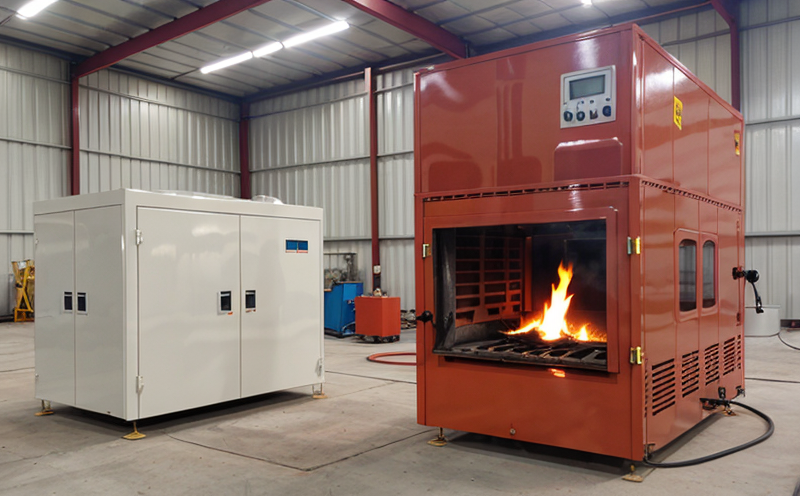ISO 1928 Solid Mineral Fuels Calorific Value Testing
The ISO 1928 standard provides a method for determining the calorific value of solid mineral fuels, which is crucial in ensuring that these fuels meet specified quality standards and are suitable for various applications. This testing ensures compliance with industry regulations and supports the reliable performance of fuel systems.
Calorific value, or heating value, refers to the amount of heat released when a unit mass of fuel undergoes combustion. Accurate calorific value measurement is essential in industries that rely on solid fuels for energy generation, such as power plants, industrial boilers, and manufacturing processes. The test involves measuring the heat produced by burning a known quantity of the fuel under controlled conditions.
The process begins with sample preparation, where the solid mineral fuel is carefully weighed and conditioned to remove moisture content. Once prepared, the fuel undergoes combustion in a calorimeter, which measures the heat generated during the reaction. The results are then compared against reference values provided by ISO 1928, ensuring that the fuel meets specified quality parameters.
The importance of accurate calorific value testing cannot be overstated. It helps in optimizing fuel consumption, improving energy efficiency, and reducing operational costs. For industries such as power generation, where reliability is paramount, knowing the exact calorific value ensures consistent performance and reduces the risk of inefficiencies or failures. Moreover, compliance with ISO standards enhances trust among stakeholders and supports long-term business success.
In summary, ISO 1928 solid mineral fuels calorific value testing is a critical process that guarantees fuel quality, optimizes operational efficiency, and ensures regulatory compliance. By adhering to this standard, businesses can ensure they are providing reliable and consistent products that meet the highest industry standards.
Scope and Methodology
The ISO 1928 standard specifies a method for determining the calorific value of solid mineral fuels by means of bomb calorimetry. This involves measuring the heat produced when a known quantity of fuel is combusted in a calorimeter under controlled conditions.
- Sample Preparation: The sample must be dried to constant weight at 105°C ± 2°C, then cooled and weighed accurately. Dried samples should have less than 1% moisture content.
- Bomb Calorimeter: The calorimeter consists of an inner vessel containing the fuel sample and an outer vessel filled with a known volume of water. Combustion occurs in an oxygen-rich environment, typically using pure oxygen gas.
- Combustion Process: The sample is ignited, and combustion proceeds until all fuel has been consumed. The heat released during this process is measured by the temperature increase in the calorimeter water.
Theoretical considerations involve calculating the amount of heat produced based on the mass of the fuel used and the temperature rise observed in the water. Corrections are made for factors such as air compression, bomb efficiency, and inert gases present in the combustion products. The final result is expressed in MJ/kg or J/g.
This method ensures consistent results across different laboratories by providing a standardized approach to calorific value determination. Compliance with ISO 1928 helps maintain high-quality standards for solid mineral fuels, supporting industries that rely on these materials for energy generation and process heating.
Benefits
The benefits of ISO 1928 calorific value testing are manifold. Firstly, it provides accurate and reliable data on fuel quality, which is essential for optimizing combustion processes and improving overall efficiency in industrial applications. Secondly, by adhering to this standard, businesses can ensure consistent product performance across different batches or suppliers.
Thirdly, compliance with ISO 1928 enhances market credibility and trust among stakeholders, including customers, regulators, and investors. This is particularly important for industries where fuel quality directly impacts safety and operational reliability. Fourthly, accurate calorific value testing supports regulatory compliance, ensuring that products meet legal requirements and industry standards.
In addition to these tangible benefits, the process also contributes to environmental sustainability by promoting efficient use of resources and minimizing waste. By optimizing combustion processes, businesses can reduce emissions and lower overall carbon footprints. This aligns with broader sustainability goals and helps companies position themselves as responsible corporate citizens.
Finally, ISO 1928 calorific value testing fosters continuous improvement within organizations by providing actionable insights into fuel performance. Regular testing allows for proactive adjustments to production processes, ensuring that fuels meet the highest quality standards consistently over time.
Quality and Reliability Assurance
- Instrument Calibration: All equipment used in calorific value testing must be regularly calibrated according to manufacturer guidelines. This includes the bomb calorimeter, oxygen supply system, and temperature measurement devices.
- Data Validation: Each test result should be validated against reference values provided by ISO 1928. Any discrepancies are investigated thoroughly before final results are reported.
- Traceability: Calibration certificates for all instruments used in testing must be traceable to national or international standards, ensuring the accuracy and reliability of results.
- Quality Control: Regular audits and quality checks are conducted to ensure that laboratory procedures adhere strictly to ISO 1928. This includes maintaining proper documentation and record-keeping practices.
The implementation of these measures ensures that every calorific value test conducted meets the highest standards of accuracy, reliability, and consistency. By adhering to these best practices, we provide clients with confidence in the quality of our services and the integrity of their testing results.





